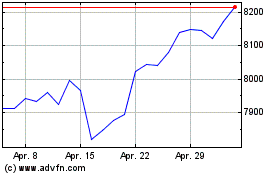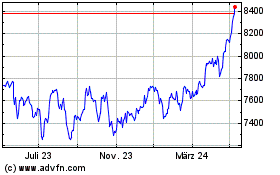By Carla Mozee, MarketWatch
European stocks dropped to their lowest in three weeks Thursday,
struggling after data showed business activity in the eurozone is
at its slowest pace of expansion in more than a year.
Euro strength also played a part in cutting down equities as the
U.S. dollar was dragged down in the wake of the Federal Reserve's
policy statement. Next up for the regional market will be the Bank
of England's policy decision.
How markets are moving
The Stoxx Europe 600 index fell 0.8% to 371.51. No sector traded
higher and the telecom group fared the worst.
France's CAC 40 index gave up 0.9% to 5,190.05, and Germany's
DAX 30 slid 1% to 12,188.92.
The U.K.'s FTSE 100 index shed 0.5% at 7,004.45 and opened up
below the 7,000 mark for the first time since December 2016.
The euro bought $1.2326, down from $1.2338 late Wednesday in New
York, pulling back from an intraday high of $1.2369.
Read:Germany's DAX forms 'death cross' chart pattern
(http://www.marketwatch.com/story/ach-du-meine-gute-germanys-dax-forms-death-cross-chart-pattern-2018-03-21)
What's driving markets
European stocks overall were pushing toward their lowest since
March 3, according to FactSet data. Equities were under pressure as
data firm IHS Markit's closely watched readings on business
activity in the eurozone fell short of expectations.
Separately, German business sentiment slightly dampened in
March, with think-tank Ifo saying its survey indicated the threat
of protectionism in global trade is darkening sentiment in Europe's
largest economy.
As trading got underway, the euro gained against the U.S.
dollar, but has since retreated following the Markit and IFO
reports. Euro strength can pull down shares of European exporters
on the prospect that a higher value of the euro could hurt revenue
and earnings made overseas by those companies.
The dollar fell against most major currencies after the Fed
signaled three interest rate increases in 2018, disappointing
investors hoping for a signal of four hikes after upbeat inflation
and labor data. The U.S. central bank did raise its benchmark fed
funds rate as expected
(http://www.marketwatch.com/story/fed-lifts-rates-in-powells-first-meeting-says-outlook-has-strengthened-2018-03-21)
on Wednesday. The Fed's monetary policy tends to drive financial
markets globally, as many companies do business in the word's
largest economy and it can lift borrowing rates for them.
U.S. stock futures were dropping on Thursday.
Investors will now turn their focus to the Bank of England's
monetary policy statement, due at 12 p.m. London time, or 8 a.m.
Eastern Time. The U.K. central bank isn't expected to make any
significant move, but policy makers will be watched for signs they
will raise interest rates in May. A reading on British retail sales
in February that arrived ahead of the BOE's statement came in
slightly better than anticipated.
What strategists are saying
"U.S. futures are coming under pressure once again ahead of the
open on Thursday, as investors continue to display an anxiety about
the path of interest rates against a backdrop of escalating trade
conflicts," said Craig Erlam, Oanda's senior market analyst, in a
note.
"On top of that, Donald Trump seems intent on starting trade
wars, most notably with China, which could trigger a wave of
protectionism and drive up prices in the US. and likely weigh on
the growth momentum. How the central bank deals with this will be
very interesting given the already fast pace of hikes," Erlam
said.
"Amid the healthy acceleration in nominal wages and real GDP
growth above trend, we upgrade our BOE outlook to four 25 basis
points hikes over the next two years, up from three before, with
two hikes in 2018 and now two in 2019 (up from one)," said Kallum
Pickering, senior U.K. economist at Berenberg, in a note.
"This would take the bank rate to 1.5% by the end of 2019. We
look for the next 25 [basis points] hike in May 2018. With its
negative real rate and large balance sheet, the BoE will remain
accommodative well into the medium term," he said.
Stock movers
Reckitt Benckiser Group PLC (RB.LN) shares surged 5% after the
consumer goods company said it's ending talks about its potential
purchase of Pfizer Inc.'s
(http://www.marketwatch.com/story/reckitt-benckiser-ends-talks-to-buy-pfizer-unit-2018-03-22-44851030)(PFE)
consumer health-care business. Reckitt Benckiser said it was
looking to buy just part of the business, but that goal couldn't be
met.
Ted Baker PLC (TED.LN) slid 7.8% after the luxury fashion
retailer warned that trading conditions will remain challenging
(http://www.marketwatch.com/story/ted-baker-2018-profit-up-but-warns-on-challenges-2018-03-22)
in the markets in which it operates.
IG Group Holdings PLC (IGG.LN) climbed 4.2%, with the online
trading platform posting a 30% rise in third-quarter revenue to
GBP152.9 million pounds ($215.0 million), bolstered by increased
client numbers and cryptocurrency trading
(http://www.marketwatch.com/story/ig-revenue-hits-record-boosted-by-crypto-trading-2018-03-22).
United Internet AG (UTDI.XE) dropped 8.1% following a
disappointing 2017 earnings report.
Halma PLC (HLMA.LN) fell 3.5% as safety, health and
environmental technology group said its first-half foreign-exchange
benefits reversed in the second half. It also forecast adjusted
pretax profit for fiscal 2018 to be in line with market
expectations
(http://www.marketwatch.com/story/halma-sees-2018-profit-in-line-with-forecasts-2018-03-22).
Economic data
IHS Markit said its flash eurozone composite PMI was 55.3, an
14-month low. That was below the 56.8 consensus estimate from a
FactSet survey of analysts.
The eurozone's current-account surplus -- which measures the
flow of goods, services and investments -- rose in January to
EUR37.6 billion
(http://www.marketwatch.com/story/eurozone-current-account-surplus-rises-in-january-2018-03-22),
the highest level in four months, according to European Central
Bank data.
U.K. retail sales grew by 0.8%
(http://www.marketwatch.com/story/uk-retail-sales-rebound-in-february-2018-03-22)
on month in February, twice the pace seen in a Wall Street Journal
survey of analysts.
Check out:Brexit hard-liners fling fish into River Thames in
bizarre protest
(http://www.marketwatch.com/story/brexit-hard-liners-fling-fish-into-river-thames-in-bizarre-protest-2018-03-21)
(END) Dow Jones Newswires
March 22, 2018 06:45 ET (10:45 GMT)
Copyright (c) 2018 Dow Jones & Company, Inc.
FTSE 100
Index Chart
Von Mär 2024 bis Apr 2024

FTSE 100
Index Chart
Von Apr 2023 bis Apr 2024
